-
 A biography of Jesse's father, Mitchell Stuart - a rural man who could not read or write. But Mick Stuart had learned the important things in life from the hills around him. He began his work before daylight, and stopped only when his family, his farm, and his animals were cared for. Jesse Stuart tells how his father taught him the unalterable values of right and wrong, love of family, and love of education. By Jesse Stuart
A biography of Jesse's father, Mitchell Stuart - a rural man who could not read or write. But Mick Stuart had learned the important things in life from the hills around him. He began his work before daylight, and stopped only when his family, his farm, and his animals were cared for. Jesse Stuart tells how his father taught him the unalterable values of right and wrong, love of family, and love of education. By Jesse Stuart -
 This nature novel, by following the hatching and lifetime experiences of the last know wild passenger pigeon, chronicles the life, natural history, and ultimate extinction of this species which was once the most abundant bird species in North America. The last wild bird was killed in 1900; the last captive bird died in 1914. By Allan Eckert
This nature novel, by following the hatching and lifetime experiences of the last know wild passenger pigeon, chronicles the life, natural history, and ultimate extinction of this species which was once the most abundant bird species in North America. The last wild bird was killed in 1900; the last captive bird died in 1914. By Allan Eckert -
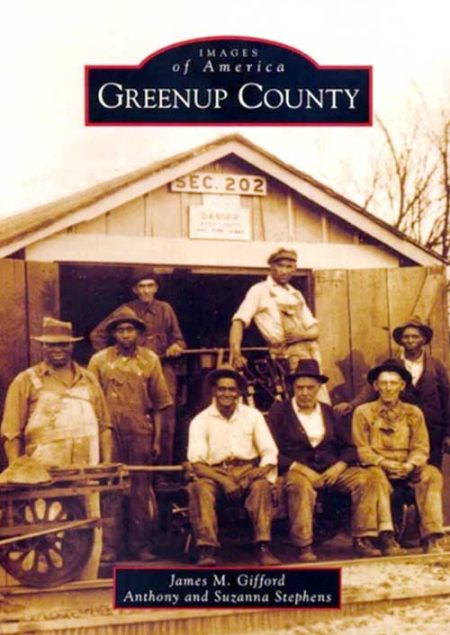 Greenup County, bordering the Ohio River in northeastern Kentucky, is rich in history and culture. Settlers first arrived in the mid-1700s and carved farms from hardwood forests. Lucy Virgin Downs, the first white child born west of the Alleghenies, lived in Greenup County, as did Jesse Boone, brother of Kentucky icon Daniel Boone. The 20th century brought industrialization and economic diversification to the historically agricultural area. Ashland Oil, a Fortune 500 company, maintained corporate headquarters in Greenup County. Two steel mills, a large rail yard, an excellent hospital, and a number of surface mines also provided employment to many people who continued to work their family farms, too. This economic progress was mirrored in every aspect of country life as education, health care, and recreation all improved dramatically. Today Greenup County’s history is appreciated by both longtime residence and cultural tourists. James M. Gifford serves as chief executive and senior editor of the Jesse Stuart Foundation, a regional publishing house. Dr. Gifford’s coauthors, Anthony and Suzanna Stephens, are eastern Kentuckians. The authors gathered photographs from dozens of personal and library collections.SOFTBACK By James M. Gifford, Anthony and Suzanna Stephens
Greenup County, bordering the Ohio River in northeastern Kentucky, is rich in history and culture. Settlers first arrived in the mid-1700s and carved farms from hardwood forests. Lucy Virgin Downs, the first white child born west of the Alleghenies, lived in Greenup County, as did Jesse Boone, brother of Kentucky icon Daniel Boone. The 20th century brought industrialization and economic diversification to the historically agricultural area. Ashland Oil, a Fortune 500 company, maintained corporate headquarters in Greenup County. Two steel mills, a large rail yard, an excellent hospital, and a number of surface mines also provided employment to many people who continued to work their family farms, too. This economic progress was mirrored in every aspect of country life as education, health care, and recreation all improved dramatically. Today Greenup County’s history is appreciated by both longtime residence and cultural tourists. James M. Gifford serves as chief executive and senior editor of the Jesse Stuart Foundation, a regional publishing house. Dr. Gifford’s coauthors, Anthony and Suzanna Stephens, are eastern Kentuckians. The authors gathered photographs from dozens of personal and library collections.SOFTBACK By James M. Gifford, Anthony and Suzanna Stephens -
 Jesse Stuart was a paradox. For a period of his life, Jesse slept with a loaded gun under his pillow, yet he also carried a typewriter with him wherever he went. He courted woman with mud on his boots and pistols on his hips, but he had wildflowers in his hands and envelops completely covered with chicken-scratched poems in his pockets. He was petty yet often kind, mean-spirited but truly helpful to beginning writers, clannish yet hospitable to visitors HARDBACK By James M. Gifford
Jesse Stuart was a paradox. For a period of his life, Jesse slept with a loaded gun under his pillow, yet he also carried a typewriter with him wherever he went. He courted woman with mud on his boots and pistols on his hips, but he had wildflowers in his hands and envelops completely covered with chicken-scratched poems in his pockets. He was petty yet often kind, mean-spirited but truly helpful to beginning writers, clannish yet hospitable to visitors HARDBACK By James M. Gifford -
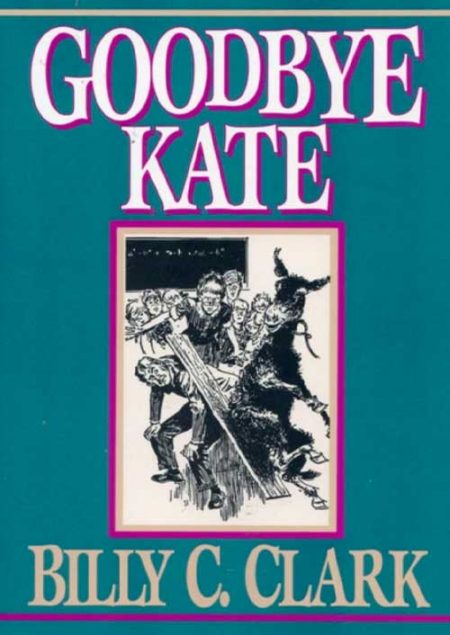 Goodbye Kate, Billy C. Clark’s sixth novel, is based in part on a mule he once owned. In the novel, Kate is found far back in the hills by a lonely country boy named Isaac Warfield. He lives close enough to Tatesburg, the nearest town, to walk to school there, but it’s a small town, and his home is isolated. Isaac has graduated from the little country school he has attended and the other members of his class will be moving on to another school, or to no school at all. He won’t have much contact with his friends anymore, and the nearest neighbor, a money-hungry man named Simm Johns, has no children and is “mean as a striped snake.” Isaac finds Kate when he goes back into the hills to pick some blackberries for his mother. The little mule is apparently as lonely as Isaac is, and she adopts him and follows him home – as far as the pine grove above the house, that is. By Billy C. Clark
Goodbye Kate, Billy C. Clark’s sixth novel, is based in part on a mule he once owned. In the novel, Kate is found far back in the hills by a lonely country boy named Isaac Warfield. He lives close enough to Tatesburg, the nearest town, to walk to school there, but it’s a small town, and his home is isolated. Isaac has graduated from the little country school he has attended and the other members of his class will be moving on to another school, or to no school at all. He won’t have much contact with his friends anymore, and the nearest neighbor, a money-hungry man named Simm Johns, has no children and is “mean as a striped snake.” Isaac finds Kate when he goes back into the hills to pick some blackberries for his mother. The little mule is apparently as lonely as Isaac is, and she adopts him and follows him home – as far as the pine grove above the house, that is. By Billy C. Clark -
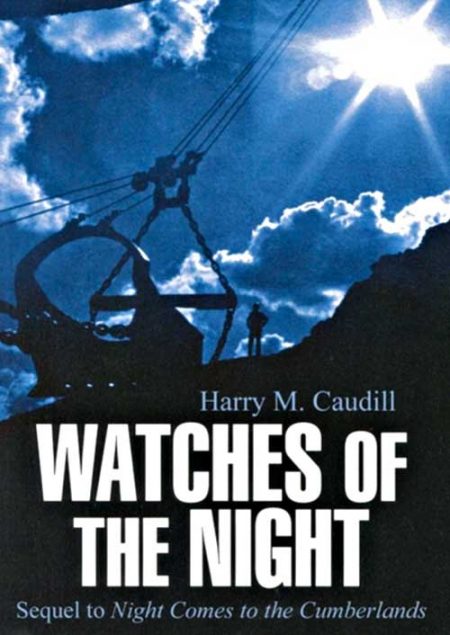 In 1963, Harry M. Caudill published his now classic account of the reckless, deliberate despoliation of the Appalachian Plateau, Night Comes to the Cumberlands. Thirteen years later, in The Watches of the Night, Caudill continued the heartbreaking story of an incredibly rich land inhabited by a grindingly poor people whose problems, despite state and local aid and an unprecedented boom in coal, had worsened: the land was being stripped more rapidly than ever; the people’s traditional relationship with the land was being uprooted, and their old customs eliminated by standardization Both a narrative history and a polemic against greed and waste, The Watches of the Night hammers at “the profligacy growing out of the persistent myth of superabundance.” The author ponders an even darker future if the cycle of boom and bust is not broken. He writes: “Americans have never understood or respected the finely textured, little-hill terrain of the Cumberland Plateau.” Neither the farmers nor the miners who followed the early pioneers saw it as a place cherish. Through decades that have lengthened to nearly two centuries the land has fought back, sometimes with savage floods and always with persistent efforts to reforest. “But now times runs out and our “inexhaustible” resources have turned finite….The Kentucky Cumberlands are many things, but most of all they are a warning.” By Harry M. Caudill
In 1963, Harry M. Caudill published his now classic account of the reckless, deliberate despoliation of the Appalachian Plateau, Night Comes to the Cumberlands. Thirteen years later, in The Watches of the Night, Caudill continued the heartbreaking story of an incredibly rich land inhabited by a grindingly poor people whose problems, despite state and local aid and an unprecedented boom in coal, had worsened: the land was being stripped more rapidly than ever; the people’s traditional relationship with the land was being uprooted, and their old customs eliminated by standardization Both a narrative history and a polemic against greed and waste, The Watches of the Night hammers at “the profligacy growing out of the persistent myth of superabundance.” The author ponders an even darker future if the cycle of boom and bust is not broken. He writes: “Americans have never understood or respected the finely textured, little-hill terrain of the Cumberland Plateau.” Neither the farmers nor the miners who followed the early pioneers saw it as a place cherish. Through decades that have lengthened to nearly two centuries the land has fought back, sometimes with savage floods and always with persistent efforts to reforest. “But now times runs out and our “inexhaustible” resources have turned finite….The Kentucky Cumberlands are many things, but most of all they are a warning.” By Harry M. Caudill -
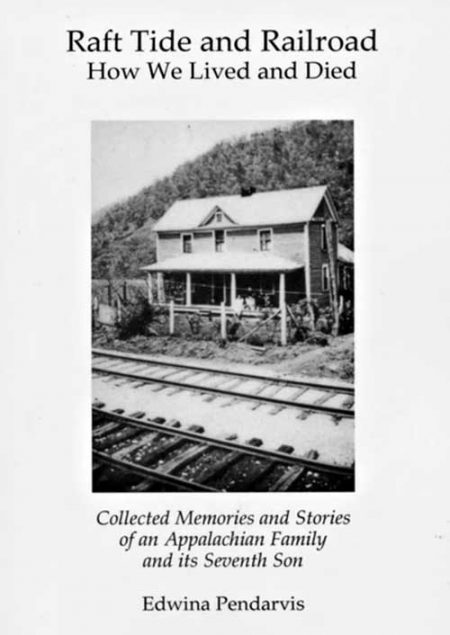 In this family history, “Raft Tide and Railroad: How We Lived and Died — Collected Memories and Stories of an Appalachian Family and Its Seventh Son,” Appalachian author, poet, and editor Dr. Edwina Pendarvis, was guided by sage advice from a grandmother, Jet Johnson, known only to her through family stories and photographs. Not long before Johnson was murdered, she asked one of her sons to note the strength of a bundle of twigs – as opposed to an individual twig – and see it as a metaphor for family strength – a metaphor originated by an earlier Appalachian – the warrior Tecumseh. In “Raft Tide and Railroad,” the author has preserved her family’s history and recognized its strength through accounts that span seven generations of experiences in Virginia, Kentucky, and West Virginia from the early 1800s to the present. SOFTBACK VERSION By Edwina Pendarvis
In this family history, “Raft Tide and Railroad: How We Lived and Died — Collected Memories and Stories of an Appalachian Family and Its Seventh Son,” Appalachian author, poet, and editor Dr. Edwina Pendarvis, was guided by sage advice from a grandmother, Jet Johnson, known only to her through family stories and photographs. Not long before Johnson was murdered, she asked one of her sons to note the strength of a bundle of twigs – as opposed to an individual twig – and see it as a metaphor for family strength – a metaphor originated by an earlier Appalachian – the warrior Tecumseh. In “Raft Tide and Railroad,” the author has preserved her family’s history and recognized its strength through accounts that span seven generations of experiences in Virginia, Kentucky, and West Virginia from the early 1800s to the present. SOFTBACK VERSION By Edwina Pendarvis -
Out of stock
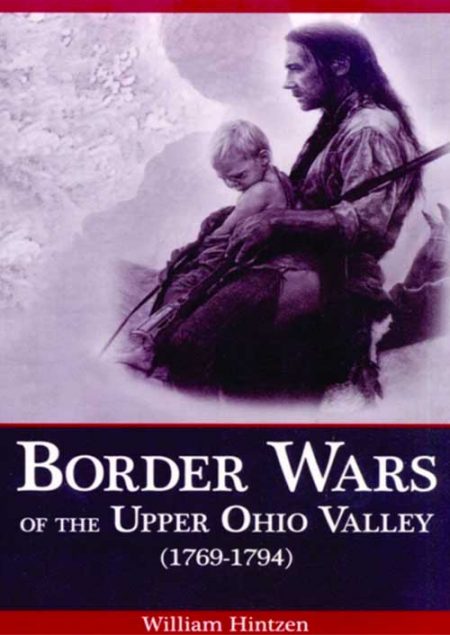 Border Wars of the Upper Ohio Valley is the story of the Trans-Allegheny movement in the quarter-century from 1769-1794. It embraces the area of the present United States from western Pennsylvania to the Mississippi, and from the Great Lakes southward into Tennessee. The story of this westward movement begins with the emigration of the Zane family from the South Branch of the Potomac River, from their home near Moorefield, in present Hardy County, West Virginia, to the mouth of Wheeling Creek in the panhandle of that state, and concludes with Anthony Wayne’s victory over the confederated Indian tribes at Fallen Timbers. William Hintzen’s book brings back the days of Daniel Boone, the Zane family (founders of Wheeling), Simon Kenton, Lewis Wetzel (Death Wind, as the Indians knew him), the 1777 siege of Fort Henry, the Girty brothers, Sam McCo9lloch, Betty Zane’s dash for gunpowder, the remarkable Wetzel family, Sam Brady, George Rogers Clark and Mad Anthony Wayne’s final victory at Fallen Timbers. By William Hintzen
Border Wars of the Upper Ohio Valley is the story of the Trans-Allegheny movement in the quarter-century from 1769-1794. It embraces the area of the present United States from western Pennsylvania to the Mississippi, and from the Great Lakes southward into Tennessee. The story of this westward movement begins with the emigration of the Zane family from the South Branch of the Potomac River, from their home near Moorefield, in present Hardy County, West Virginia, to the mouth of Wheeling Creek in the panhandle of that state, and concludes with Anthony Wayne’s victory over the confederated Indian tribes at Fallen Timbers. William Hintzen’s book brings back the days of Daniel Boone, the Zane family (founders of Wheeling), Simon Kenton, Lewis Wetzel (Death Wind, as the Indians knew him), the 1777 siege of Fort Henry, the Girty brothers, Sam McCo9lloch, Betty Zane’s dash for gunpowder, the remarkable Wetzel family, Sam Brady, George Rogers Clark and Mad Anthony Wayne’s final victory at Fallen Timbers. By William Hintzen -
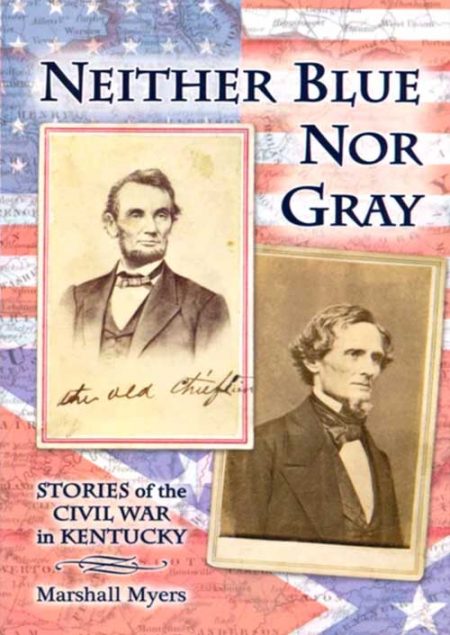 The Civil War affected the daily lives of almost everyone in the Commonwealth of Kentucky, a slave holding state that chose not to secede from the United States. Here are the untold stories of lesser known combatants or the folks back home who suffered in so many ways from the ravages of war. Seventeen chapters range in topics from interviews with former slaves to an examination of Mary Todd Lincoln's family's military involvement in the war. SOFTBACK By Marshall Myers
The Civil War affected the daily lives of almost everyone in the Commonwealth of Kentucky, a slave holding state that chose not to secede from the United States. Here are the untold stories of lesser known combatants or the folks back home who suffered in so many ways from the ravages of war. Seventeen chapters range in topics from interviews with former slaves to an examination of Mary Todd Lincoln's family's military involvement in the war. SOFTBACK By Marshall Myers -
 Following World War I, our nation entered a decade of national prosperity. Businesses flourished, and the standard of living rose. Jobs were plentiful and Americans were better fed, clothed, and housed than they had ever been before. However, the prosperity of the roaring twenties did not filter down to the rural poor of Appalachia. When Jack Ellis was born to Lon and Dot Ellis in 1927, the family lived near Morehead, Kentucky in a dilapidated, leaky, rat-infested house with no screens on the windows and one room that had a dirt floor. By the time Jack entered grade school, America was mired in the Great Depression. During the 30s, his father was employed by the Civilian Conservation Corp. for several years, but his mother became discouraged and depressed after losing her teaching position in the Rowan County schools. By Jack D. Ellis
Following World War I, our nation entered a decade of national prosperity. Businesses flourished, and the standard of living rose. Jobs were plentiful and Americans were better fed, clothed, and housed than they had ever been before. However, the prosperity of the roaring twenties did not filter down to the rural poor of Appalachia. When Jack Ellis was born to Lon and Dot Ellis in 1927, the family lived near Morehead, Kentucky in a dilapidated, leaky, rat-infested house with no screens on the windows and one room that had a dirt floor. By the time Jack entered grade school, America was mired in the Great Depression. During the 30s, his father was employed by the Civilian Conservation Corp. for several years, but his mother became discouraged and depressed after losing her teaching position in the Rowan County schools. By Jack D. Ellis



